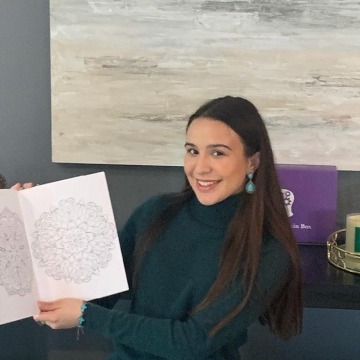Northwestern Student Develops Subscription Box for Individuals with Dementia
For most of her life, Victoria Da Conceicao's grandmother lived 15 minutes away. When her family moved two hours away as Victoria started high school, she spent most of the year away from her grandmother. Homesick, Victoria decided to move back to the Bay Area and finish high school living with grandmother. That's when her grandmother's dementia symptoms started.
 One day Victoria’s grandmother was supposed to pick her up from school, but after an hour and a half of waiting, she still had not come. Victoria called her uncle who came to the school and after some searching, they found her grandmother wandering around a park near the high school.
One day Victoria’s grandmother was supposed to pick her up from school, but after an hour and a half of waiting, she still had not come. Victoria called her uncle who came to the school and after some searching, they found her grandmother wandering around a park near the high school.
Victoria knew something was wrong. When they took her grandmother to the doctor, they discovered that she hadn't been remembering to take her insulin. The problem was deeper than that though. More visits with specialists revealed Alzheimer’s disease, and her grandmother’s world changed quickly. She was no longer able to drive or leave the house on her own — she lost a sense of independence.
There was a sense of loss, but Victoria, now a sophomore at Northwestern, looked for ways to keep her grandmother engaged. Her research found that keeping her grandmother's brain active was key. She started to create coloring and activity sheets for her. Although she couldn’t change her grandmother’s diagnosis, she could change her response to it. She was inspired to develop Alzheimer's Brain Box — a care package subscription service designed for individuals with dementia.
“I like putting a smile on people’s faces," Victoria said. She was able to spread joy through custom coloring and activity pages that gave individuals with dementia something to enjoy.
“More than bringing joy, it was my therapy at first," Victoria noted. Doing something helped Victoria cope with the way her grandmother was changing. Her love for her grandmother created a sense of urgency inside her to do something meaningful that could improve the quality of life for other individuals with dementia.
Since the COVID-19 pandemic, Alzheimer’s Brain Box has adapted to provide unique boxes each month to keep subscribers engaged during the extended time at home.
Additionally, Victoria is invested in raising awareness about dementia in Latino communities. Research shows that Latinos are 1.5 times more likely than non-Latino whites to develop Alzheimer’s disease. Furthermore, research has found that symptoms of Alzheimer’s appear almost seven years earlier in Latinos than in non-Latino whites.
In the coming months, Alzheimer’s Brain Box is planning to offer free boxes to individuals in the Chicago area. Victoria is looking for potential sponsors of the initiative.